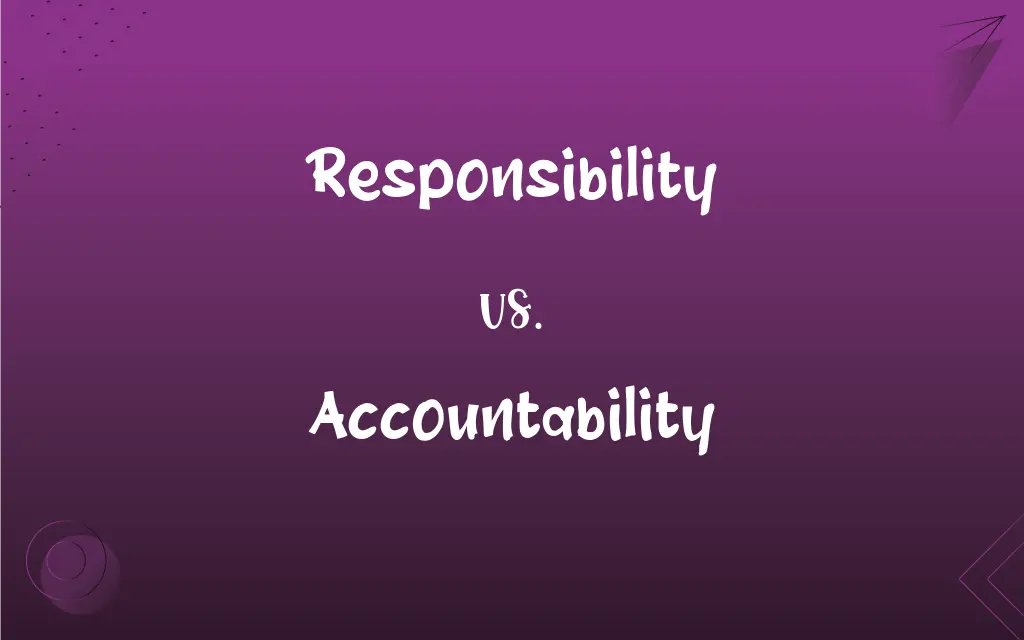Responsibility vs. Accountability: What's the Difference?
Edited by Aimie Carlson || By Harlon Moss || Updated on October 21, 2023
Responsibility refers to duties; accountability means answerability for outcomes.

Key Differences
Responsibility often denotes the tasks or duties assigned to a person or entity. It is about the roles or obligations that one must fulfill. For example, a student's responsibility might be to complete homework on time. On the other hand, accountability indicates the state of being answerable for one's actions or outcomes. It concerns consequences and the need to explain or justify actions.
Responsibility is about ownership of tasks. It’s the commitment to successfully perform a task without necessarily facing consequences if things go wrong. Accountability, meanwhile, is about ownership of results. No matter who performed the task, the accountable party is the one who must answer for the results, be they good or bad.
Responsibility can exist without accountability. A person can be given a responsibility, but if there's no mechanism or expectation to report back on the outcome, they might not be held accountable. However, accountability doesn’t exist without some form of responsibility. If someone is held accountable for an outcome, it implies they had some responsibility related to that outcome.
Responsibility can be shared among multiple individuals or departments. For instance, in a project, different team members have different responsibilities. Accountability, however, often lies with a single person or entity. Even if many contributed to an outcome, there is often one individual, like a project manager, who is ultimately accountable for the result.
Comparison Chart
Definition
A duty or task one is required or expected to perform.
Being answerable for the results of actions, decisions, and policies.
ADVERTISEMENT
Focus
On tasks or duties.
On outcomes or results.
Presence of Outcome
Can exist without a final outcome.
Always tied to an outcome or result.
Shared or Singular
Can be shared among multiple parties.
Typically rests with a single party.
Consequence
Not always tied to consequences.
Involves consequences if outcomes aren't met.
Responsibility and Accountability Definitions
Responsibility
An obligation one has towards something or someone.
As a teacher, he felt a deep responsibility to educate his students well.
ADVERTISEMENT
Accountability
The state of being answerable for actions or decisions.
The CEO's accountability ensured he faced the board for the company's losses.
Responsibility
The state of being in charge of something.
The responsibility of managing the event was given to Clara.
Accountability
Facing consequences for actions or outcomes.
Due to a lack of results, the manager's accountability was called into question.
Responsibility
A duty or task one must fulfill.
It is John's responsibility to feed the dog.
Accountability
An obligation to report, explain, or justify something.
With the grant money, there's a high level of accountability to the donors.
Responsibility
A burden or expectation placed upon someone.
With great power comes great responsibility.
Accountability
Being held to a standard or expectation.
Teachers have an accountability to impart knowledge to their students.
Responsibility
A moral commitment to behave correctly.
We all have a responsibility to protect the environment.
Accountability
Accepting responsibility for one's actions or decisions.
She took full accountability for the error in the report.
Responsibility
The state, quality, or fact of being responsible.
Accountability
Expected or required to account for one's actions; answerable.
FAQs
How does accountability relate to outcomes?
Accountability relates to being answerable for outcomes or results.
What is the primary focus of responsibility?
Responsibility primarily focuses on tasks or duties.
Is it common for one person to be solely accountable?
Yes, often accountability rests with a single individual, even if responsibilities are shared.
What's a simple way to differentiate responsibility and accountability?
Responsibility is about tasks, while accountability is about outcomes.
Can a person refuse a responsibility?
Yes, a person can refuse a responsibility unless contractually or morally obligated.
If someone fails in their responsibilities, are they always held accountable?
Not always, consequences tied to accountability depend on the expectation set beforehand.
Can you give an example where responsibility exists without accountability?
A volunteer may have the responsibility to set up chairs for an event but may not be held accountable if they're set up incorrectly.
Who typically enforces accountability?
Accountability can be enforced by supervisors, stakeholders, or even public opinion.
Is accountability reactive, while responsibility is proactive?
Generally, responsibility is proactive as it involves tasks or duties, while accountability is reactive as it deals with outcomes.
In a corporate setting, who usually holds the accountability?
In corporations, higher management or leadership usually holds the ultimate accountability.
Is accountability more tied to ethical implications?
Yes, accountability often has ethical implications as it involves answering for outcomes.
Can accountability be delegated?
While tasks (responsibilities) can be delegated, the accountability for outcomes often remains with the original party.
Can multiple people share a responsibility?
Yes, responsibility can be shared among several individuals or groups.
Does accountability always come with consequences?
Accountability involves consequences if expected outcomes aren't achieved.
Can a person be accountable without having had any responsibilities?
Typically, if someone is held accountable, it implies they had some form of responsibility related to the outcome.
Is responsibility more about actions or results?
Responsibility is more about actions or tasks than results.
Can an organization as a whole have responsibilities?
Yes, organizations can have collective responsibilities.
Can responsibility exist without accountability?
Yes, one can have a responsibility without necessarily being held accountable for it.
Does responsibility always come with a moral obligation?
Not always, but there can be a moral aspect to many responsibilities.
Does responsibility imply control?
Responsibility often implies some level of control or authority over a task or duty.
About Author
Written by
Harlon MossHarlon is a seasoned quality moderator and accomplished content writer for Difference Wiki. An alumnus of the prestigious University of California, he earned his degree in Computer Science. Leveraging his academic background, Harlon brings a meticulous and informed perspective to his work, ensuring content accuracy and excellence.
Edited by
Aimie CarlsonAimie Carlson, holding a master's degree in English literature, is a fervent English language enthusiast. She lends her writing talents to Difference Wiki, a prominent website that specializes in comparisons, offering readers insightful analyses that both captivate and inform.































































